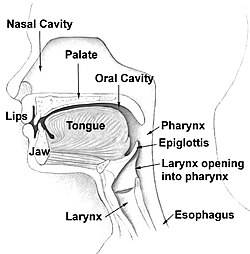
Does My Voice Sound Nasal?
How do I make my voice sound less nasal?
People respond to a voice. This has been proven through multiple research studies, some of which found voice to be twice as influential as a person's words in shaping others' opinions of them. We're not always conscious of or sure of what it is we're hearing in a voice that turns us off or pulls us in, instills confidence, or resonates with credibility.
Nasal-sounding voices seem to strike a certain chord with many listeners, and usually not in a good way. A question I frequently hear is "Does my voice sound nasal?" or "How do I make my voice sound less nasal?"
The truth is, the quality a person is often referring to isn't always nasality; oftentimes, it's twang or a combination of nasality and twang. I'll talk about what twang is later.
Whether a voice sounds too nasal is somewhat subjective. To understand what a "too nasal"- sounding voice is, it's helpful to know a little anatomy and physiology.

There are two passages for air (breath) to flow through when we speak: the oral cavity--the mouth and throat, and the nasal cavity--through the nose (and nasopharynx). A pure vowel sound has little or no nasality, because the soft palate is raised, blocking off the nasopharynx so that all or most of the air flows through the oral cavity. When the soft palate is dropped, breath flows through the nose.
To hear nasality, start with as open an "Ahh" sound as you can. Feel the big, open space in the back of your throat and listen to the clear sound. Now, slowly lower the soft palate, feeling and hearing the difference, until the sound is very nasal. Speak a few words, noticing what you hear and feel.
So, nasality is caused by the soft palate dropping. I think what happens with a lot of people is that they get a little lazy and get in the habit of letting their soft palates drop when they speak, making them sound more nasal. A "very open throat" creates a less nasal sound; raising the soft palate, in other words.

A balanced voice needs some nasal resonance; however, when a speaker is allowing too great a proportion of breath to flow through the nose, the sound can become "too nasal." Many people find this sound grating or annoying. By contrast, a voice that has too little or no nasal resonance is "hyponasal," and that's like the sound of a voice of someone who has a cold and has blocked nasal passages.
A bit more on nasality...
The three nasal consonants in English are [m], [n], and [ng]. For [m] the lips are together; for [n] the tongue tip touches the alveolar ridge, and for [ng] the back of the tongue touches the soft and hard palate.
There are some languages where nasality changes the phoneme, including French, Portuguese, Hindustani, and others. Some languages have nasalized consonants or vowels, like Chinese, Spanish, and others, but they don't change the meaning of the sound. I sometimes find myself helping non-native English speakers decrease the nasality they are adding to their vowels. We do this mainly by practicing "opening up the back of the throat."
Is it really nasality you're hearing?
Sometimes people refer to a voice as "nasal" when really, what they're hearing is "twang." Twang has less to do with the nose and, not to get too technical, more to do with making the epiglottic funnel smaller by bringing the arytenoid cartilages closer to the lower part of the epiglottis. It's the sound country singers often use. Fran Drescher of "The Nanny" spoke with a lot of twang and also extra nasality. Another extreme example of a very nasal- sounding voice is Marlon Brando's character from "The Godfather"--"We're going to make him an offer he can't refuse." Sometimes deaf people speak with a nasal-sounding voice, as well, because they are letting their soft palates drop.
There's also "brightness," a general term used for a voice that seems to emanate from the front of the face. These qualities are distinct and the language we use to describe them is important in differentiating them.

So, in a nutshell, if you think your voice sounds too nasal, the solution is simple. Raise your soft palate. "Ahh."
Then speak some words. Practice. Carry over. Ta da.
